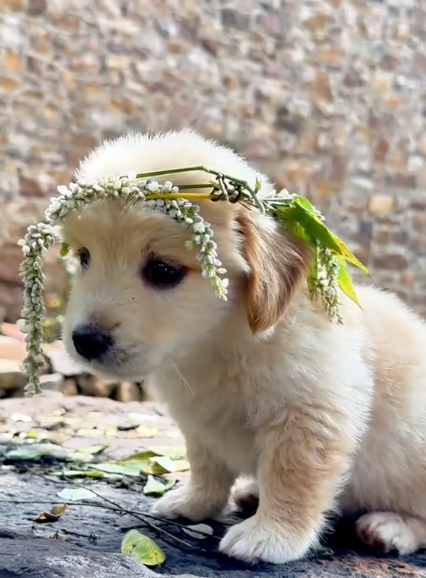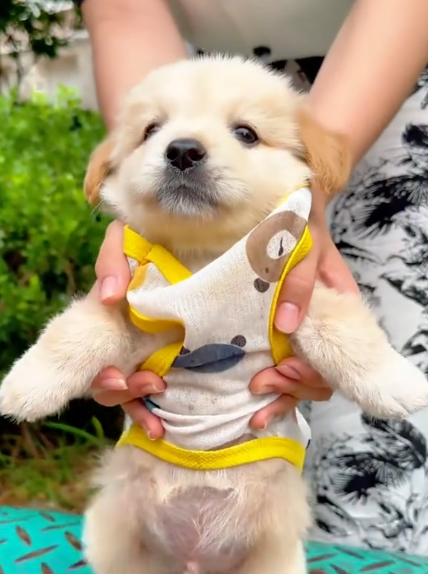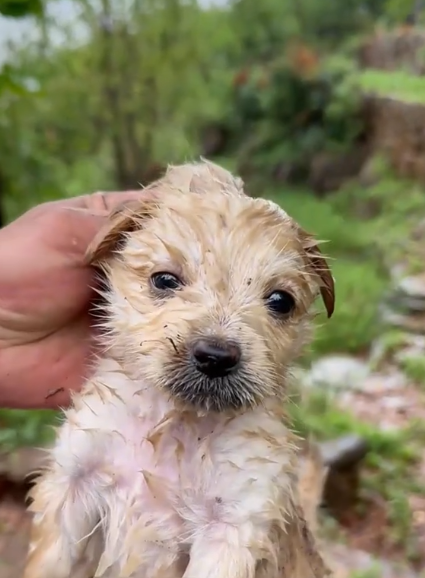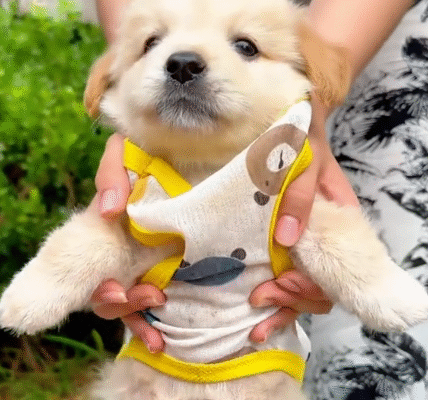
It was one of those gray, bone-chilling evenings when the wind seemed determined to push every bit of warmth out of the world. I had been walking home from the corner store, clutching a paper bag of groceries to my chest, when I spotted a small, motionless shape huddled by the edge of the alley. At first, I thought it was a discarded piece of clothing, maybe a forgotten scarf. But then it moved—just barely—a tiny, quivering tremor.
I stepped closer, my shoes crunching over gravel. That’s when I saw her. A little dog, no bigger than a loaf of bread, sat curled into herself, her fur tangled and matted, her ribs faintly visible beneath a patchy coat. Her eyes—huge, dark, and glistening—met mine. There was fear there, but also something else, something fragile yet stubborn: hope.
She didn’t bark or growl. Instead, she froze, as if unsure whether I would be a savior or another cruel stranger. My heart clenched. I crouched down slowly, murmuring soft, meaningless words—“Hey there, sweet one… you’re okay now…”—while inching closer. The cold bit at my fingers, but I extended my hand anyway. She flinched, but didn’t run.
When I finally reached her, I felt how icy her little body was. Her paws were red from the cold, and her fur was damp. Without a second thought, I set my groceries down and scooped her into my arms. She was so light I could have sworn she was made of air and bones. She trembled violently against me, pressing her face into my coat as if trying to disappear inside it.
“You’re safe now,” I whispered, tucking her closer. My scarf became her blanket, my chest her shelter. The moment my warmth touched her, she gave the faintest sigh—still wary, but no longer fighting to keep her distance.
I walked home quickly, ignoring the curious stares of a few passersby. Once inside, I wrapped her in a thick, soft towel and sat on the floor with her in my lap. She smelled faintly of damp leaves and something sour, but under it all was the faint scent of life—fragile, stubborn, and still fighting.
I fetched a small bowl of water, setting it beside us, and broke off a bit of plain bread from my groceries. She eyed it suspiciously at first, but hunger eventually won. Her tiny teeth nibbled the bread delicately, as though she feared it might be taken away.

While she ate, I studied her more closely. Her ears were slightly torn at the edges, her tail thin and limp. She had the look of an animal that had been surviving on scraps and hiding from shadows for far too long. I wondered how many nights she’d curled into herself, shivering like she had in that alley, wishing for someone—anyone—to notice her.
That night, I made her a bed from an old sweater of mine and placed it beside my own. But she refused to leave my side, climbing onto the blanket on my lap and curling up with a soft, hesitant sigh. I let her stay. I couldn’t bear the thought of her waking up and thinking I had left.
Over the next few days, she began to change. The fear in her eyes loosened, replaced by something warmer each time I returned home. She’d lift her head from her bed, tail wagging slowly, as if still surprised I kept coming back. I gave her baths to wash away the grime, fed her small, nourishing meals, and took her on short walks so she could feel the sun on her fur again.
One morning, I woke to find her pressed against my side, her nose buried in my blanket. When I moved, she looked up at me with those same wide eyes—but now, they weren’t just pleading. They were trusting.
I named her Luma, because in those dark alley moments she had been just a faint flicker of light, and now she was beginning to glow.
Weeks passed, and her fur grew thick and glossy. She learned the sound of my footsteps and the jingle of her food bowl. She chased after fallen leaves in the park, sometimes pausing mid-play to glance back at me, as if to check that I was still there. And I always was.
But the most beautiful change was the way she learned to love without fear. At first, her affection was hesitant—brief sniffs at my hand, quick tail wags. Then, one evening while I sat reading, she climbed onto the couch beside me, rested her head on my leg, and closed her eyes. It was a silent declaration: she believed my promise.

That promise had been made the night I found her—spoken softly in the dark, a vow that she would never again know hunger, cold, or loneliness. I didn’t just mean food and shelter; I meant she would always have a place where she belonged. She would always have someone who saw her not as a stray or a burden, but as family.
Sometimes, when the wind howls outside or the rain lashes against the windows, I think about that alley and the trembling little dog who might not have survived another night out there. I think about how many others like her still wait in the shadows, eyes wide with fear but holding on to the hope that kindness might find them.
Luma is no longer the shivering bundle I carried home that night. She’s a joyful, spirited little being who bounces with excitement when I say her name, who curls at my feet while I work, who greets every new day as if it’s a gift. And in a way, she is my gift.
Rescuing her didn’t just change her life—it changed mine. She reminded me that love can be quiet and small, wrapped in fur and trembling in your arms, and still be powerful enough to warm the coldest nights. She taught me that sometimes, all it takes to heal is to be truly seen, truly held, and truly promised a better tomorrow.
I still keep that old scarf—the one I wrapped around her when we first met. It’s frayed now, the fabric worn thin, but I can’t bring myself to throw it away. It carries the memory of a night when two lonely souls crossed paths, and one promise rewrote the rest of our days.
And every time I look at Luma sleeping peacefully, her little chest rising and falling in perfect rhythm, I know I meant every word: she will never face hunger, cold, or loneliness again—not for the rest of her life.



